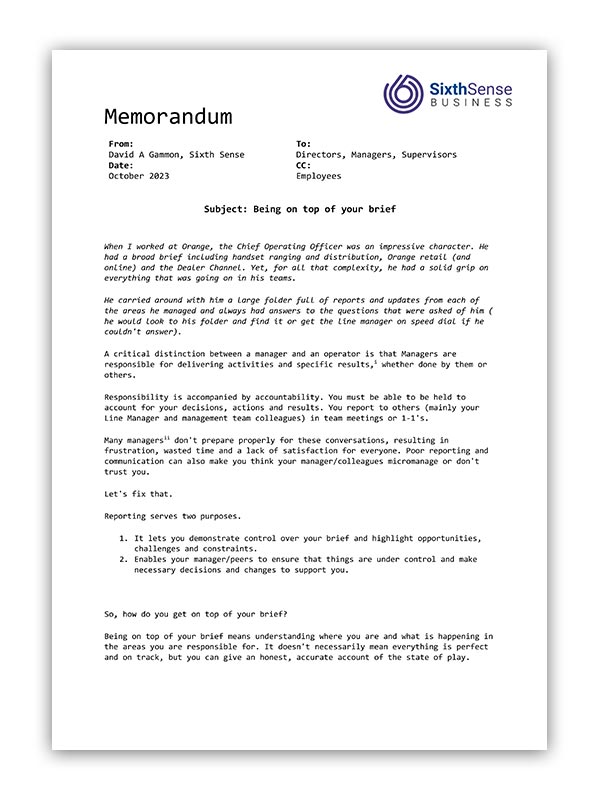From:
David A Gammon, Sixth Sense
To:
Directors, Managers, Supervisors
Date:
October, 2023
When I worked at Orange, the Chief Operating Officer was an impressive character. He had a broad brief including handset ranging and distribution, Orange retail (and online) and the Dealer Channel. Yet, for all that complexity, he had a solid grip on everything that was going on in his teams.
He carried around with him a large folder full of reports and updates from each of the areas he managed and always had answers to the questions that were asked of him ( he would look to his folder and find it or get the line manager on speed dial if he couldn’t answer).
A critical distinction between a manager and an operator is that Managers are responsible for delivering activities and specific results(i), whether done by them or others.
Responsibility is accompanied by accountability. You must be able to be held to account for your decisions, actions and results. You report to others (mainly your Line Manager and management team colleagues) in team meetings or 1-1’s.
Many managers(ii) don’t prepare properly for these conversations, resulting in frustration, wasted time and a lack of satisfaction for everyone. Poor reporting and communication can also make you think your manager/colleagues micromanage or don’t trust you.
Let’s Fix That
Reporting serves two purposes.
- It lets you demonstrate control over your brief and highlight opportunities, challenges and constraints.
- Enables your manager/peers to ensure that things are under control and make necessary decisions and changes to support you.
So, how do you get on top of your brief?
Being on top of your brief means understanding where you are and what is happening in the areas you are responsible for. It doesn’t necessarily mean everything is perfect and on track, but you can give an honest, accurate account of the state of play.
It is a brilliant opportunity to show you are on top of agreed actions from 1-1s and making reasonable progress, or at least to highlight areas where you are not (and to secure the help you need).
It’s essential in giving updates that you communicate issues honestly and without waiting to be asked by your boss(iii) in your update (not waiting to be asked by your boss – this undermines trust); all of this means you need to prepare and think about your updates.
Here’s how you take control of and deliver constructive and valuable updates.
Understand your brief
A good starting point is a clear understanding of what your brief is. What is the gun to your head for, what are the lines you have to stay within, and what are the limits of your authority?
Most managers have two elements to their roles: business as usual (the regular activities they oversee and deliver) and projects (improvement and/or development activities). Both of these need updates provided.
Know your numbers
What data do you need to collate and report to demonstrate whether you are doing what you are supposed to be doing and if it is delivering results? This involves reporting on the revenue, costs, profitability, resources, time, customer experience and quality you are responsible for.
You are answering three questions with data (so design your information accordingly).
- How well are things going?
- Are we on track to meet or exceed the target or previous performance?
- Are things getting better or worse?
Reporting numbers is not just producing them. You need to study and understand them yourself. Remember the old adage of ‘bring me solutions, not problems’. When you know your numbers, you can answer questions and offer insights, ideas and solutions(iv).
Staying within the lines
Part of reporting is also to confirm where you are operating within the guidelines, policies, and procedures the company has set out and where this is proving difficult. I refer to these things as matters of compliance. Sometimes, you’ll need to test and spot-check activities in your area to ensure you are comfortable that you are staying within the lines set by the company for acceptable operations.
Wins, opportunities, issues and problems
It would help if you were on top of all significant situations affecting your areas of responsibility and could give current updates. You aren’t expected to know the details of every single transaction and issue but must be on top of the material ones.
It’s important to include significant wins and good news. This brings a more balanced overall perspective and avoids the impression that everything is broken(v). This should include progress on projects against plan, milestones and deliverables.
You should structure your report using the flow of these headings or any pre-agreed format. If you are concerned about the level of detail you should prepare, ask your manager/peers what they would find helpful and necessary.
So, instead of thinking of reporting and updates as a burden, think of them as a proactive opportunity for you to demonstrate how on top of your brief you are, a chance to showcase your team delivery and a discussion of what more could be achieved and what would be needed to achieve it.
That’s much more exciting!
(i) These should be outlined in your job description, objectives, or at least through conversations with your manager.
(ii) On both sides of the conversation
(iii) If they have to ask about specific issues that you should be aware of, it undermines trust.
(iv) All of which reinforce your manager’s confidence and belief in you.
(v) This is especially true when giving team performance updates.

